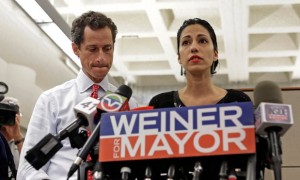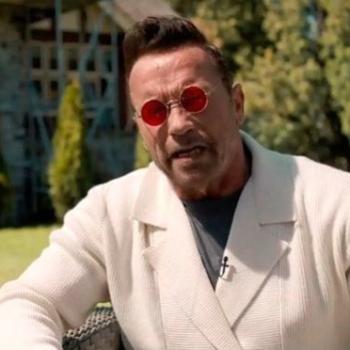At one point in the new documentary “Weiner,” when disgraced former congressman Anthony Weiner is asked a question by the crew filming his failed mayoral bid, he snaps that the point of a fly-on-the-wall documentary is that the fly doesn’t talk.
That moment sums up the success and limitations of “Weiner.” The filmmakers have unprecedented access to one of the decade’s most surreal scandals, yet the subject’s constant attempts to control his image keep him at a remove, even with the camera a foot from his face. It’s like watching a car crash where the driver doesn’t stop to examine who’s hurt, what the damage is or what went wrong; he just wants to get back on the road, even if the vehicle’s in flames.
Weiner, a Democrat from New York, gained attention for his fiery outbursts on the congressional floor, only to have it all sputter out when he sent out sexually explicit pictures on Twitter. Weiner and his wife, Huma Abedin — one of Hillary Clinton’s top advisers — salvaged their marriage, but it cost the congressman his job. The butt of jokes across television and social media, he resigned in disgrace; the movie is not subtle about the fact that his surname set him up as a walking punchline. As the film opens, he’s readying a 2013 run for mayor of New York that begins smoothly. Sure enough, though, with just weeks to go before the primary, another scandal breaks, as it’s revealed that Weiner was involved in explicit online chats and texts with several women, often using absurd pseudonyms like “Carlos Danger,” which did nothing to help him with the late night pundits.
It’s rare to get such an up-close look at a scandal. Politicians are masters at shielding their constituents from the sight of the sausage-making. We live the scandals out on late-night television and hear their positions through spin. But “Weiner” directors Josh Kriegman and Elyse Steinberg found themselves in the right place at the right time (for them). The film’s early moments, as Weiner’s mayoral campaign hits its stride, capture the momentum of the consummate politician working his magic on the community. Weiner’s more than happy to let the crew film him marching in parades alongside supporters, winning over crowds at rallies and trouncing opponents in debates. That early energy makes it all the more awkward when the scandal breaks, and we watch volunteers learn about the news on TVs in the campaign office or catch Huma and Anthony in a moment of uncomfortable silence. As the press waits for a comment, the camera observes Weiner testily working out statements with his staff before kicking the crew out of the room for a private moment with his wife. It’s the closest I can recall a film putting us to a scandal as it develops, and the sense of ever-developing catastrophe makes the film compulsively watchable.
“Why did you agree to let me film you,” the cameraman asks the candidate more than once throughout the film. He never gets a straight answer, but it’s easy to see why Weiner thought it might have been a good idea at the time. This was supposed to be his comeback, where he emerged victorious from past indiscretions with his political ambitions and family intact. And what we see of the former congressman throughout the film portrays an overly confident, ambitious and often narcissistic man. Even as his campaign implodes and his marriage is on the rocks, Weiner is brash and abrasive. He believes the scandal will blow over in 72 hours; he expects Huma to be by his side at press conferences. It’s easy to imagine this man ready to stage a comeback and all too eager to have the cameras on him so he can say “I told you so.” Throughout the movie, we see that he is nothing if not sure of himself.
But we also see that he’s horrible at decision-making. That was, of course, obvious from the first errant Tweet. But what “Weiner” captures is the candidate’s amazing ability to screw things up for himself, something he doesn’t even seem to acknowledge until his concession call’s been made. Throughout the film, Weiner shows a knack for self-sabotage, destroying his prospects even as he tries to control his image and stay in the fight. How else to explain his loud, antagonistic appearance on an MSNBC program (which he’s then shown re-watching with glee, much to Huma’s frustration)? Why else would he decide to call a heckler on the street a jackass? Is there any other reason he’d give the press the finger on election night?
It’s very easy to look at Weiner’s actions as those of a stupid man bumbling through a campaign. But in the glimpses of him on the campaign trail, or the videos of him speaking to Congress, it’s very clear he’s not dumb. He very well may have had great ideas and passion. Throughout the film, there’s a sense of mounting frustration, as past indiscretions continue to overshadow his campaign, and promises are drowned out by jokes about his name and his anatomy. In those moments of emotion, Weiner doesn’t handle himself well.
But that frustration is understandable, if not condoned. After all, Weiner had made people aware that other texts from his previous scandal could still come out; this wasn’t a new indiscretion (although the texts’ timing — coinciding with a “People” magazine story in which he pledged devotion to his family — didn’t help). And while I disagree that Weiner’s actions don’t constitute adultery, many more prominent politicians have gotten away with much worse behavior and still had thriving careers. I imagine he had to be frustrated whenever he tried to pledge his commitment to the community, only to have the media continue latching onto the story because, hey, sex scandals sell, especially if the guy’s last name is slang for the male anatomy.
Indeed, “Weiner’s” strongest asset is the way it examines the way that the culture couldn’t resist making immature jokes about the scandal. During one moment, the directors run social media and late-night television commentary across the bottom of the screen while following Weiner around; it’s amazing just how crazy the country went for stories about a mayoral candidate’s private parts. Few things are more damning of our culture than the fact that we knew more about a political candidate’s sexting scandal and underwear pictures than about the issues he supported. And the film holds special contempt for Sydney Leathers, the young woman Weiner texted with who turned the scandal into a porn career and even attempted to ambush Weiner on election night as part of a stunt for Howard Stern. She’s portrayed, possibly rightly so, as opportunistic and parasitic, willing to keep the story going if she can get something out of it.
Mixed up in all the media shenanigans and political maneuvering is the marriage between Weiner and Abedin. Huma appeared by her husband’s side throughout the scandal, particularly as it broke, even standing by him as Clinton reportedly advised her to leave. For the most part, Huma is mum around the documentary crew, save for claiming in one candid moment that it feels like she’s living in a nightmare. And while she appears in public with a smile on her face, the film catches the moments of stress, exhaustion and exasperation that wear her down. There are several moments of awkward silence between her and Anthony, and a few where she seems unable to believe just how deep the hole he dug himself goes. Weiner, for his part, can’t seem to understand why his wife might hesitate to appear in a campaign ad with him or accompany him to vote on election day. There’s almost a feeling of entitlement, that he expects her to be by his side. Near the end of the film, as the couple prepares to head to a party and give a concession speech, word arrives that Leathers is waiting at the location. In that moment, Weiner seems to gain a sense of self awareness about the toll the scandal has taken on his marriage, and he tells her to go on home. It’s his most human moment in the film.
“Weiner” is a fascinating movie, putting us right in the thick of the scandal. Yet, as I said, the figure at the center remains aloof. Sure, he put out an image of candidness during the campaign; the film captures a particularly tense encounter at City Island. But there’s never a moment were he lets his guard down for the cameras or attempts to set the record straight. He doesn’t seem to understand why people were upset about the scandal; at heart, it’s not that people were upset that he was caught sexting. It’s that he betrayed a trust. And the documentary provides him a chance to tell his side of the story, or to tell people why they should trust him again. Instead, in the talking head interviews that appear throughout the film, he bumbles about “blind spots” and authenticity, but never seems to address his own personal shortcomings or flaws that head on. On the one hand, it frustrates me that the film doesn’t press harder; on the other, I wonder if that would have done any good. By the end of the campaign, Weiner’s been through the ringer, and at one point he curses the luck of having this unfold while a documentary crew is following him.
Despite its frustrations, “Weiner” is a vital documentary, both for the access the filmmakers had and for the way it portrays Americans’ puerile fascination with sex scandals and our crazy political climate. It transcends being an easy joke and becomes a surreal, fascinating glimpse at our very weird culture.














